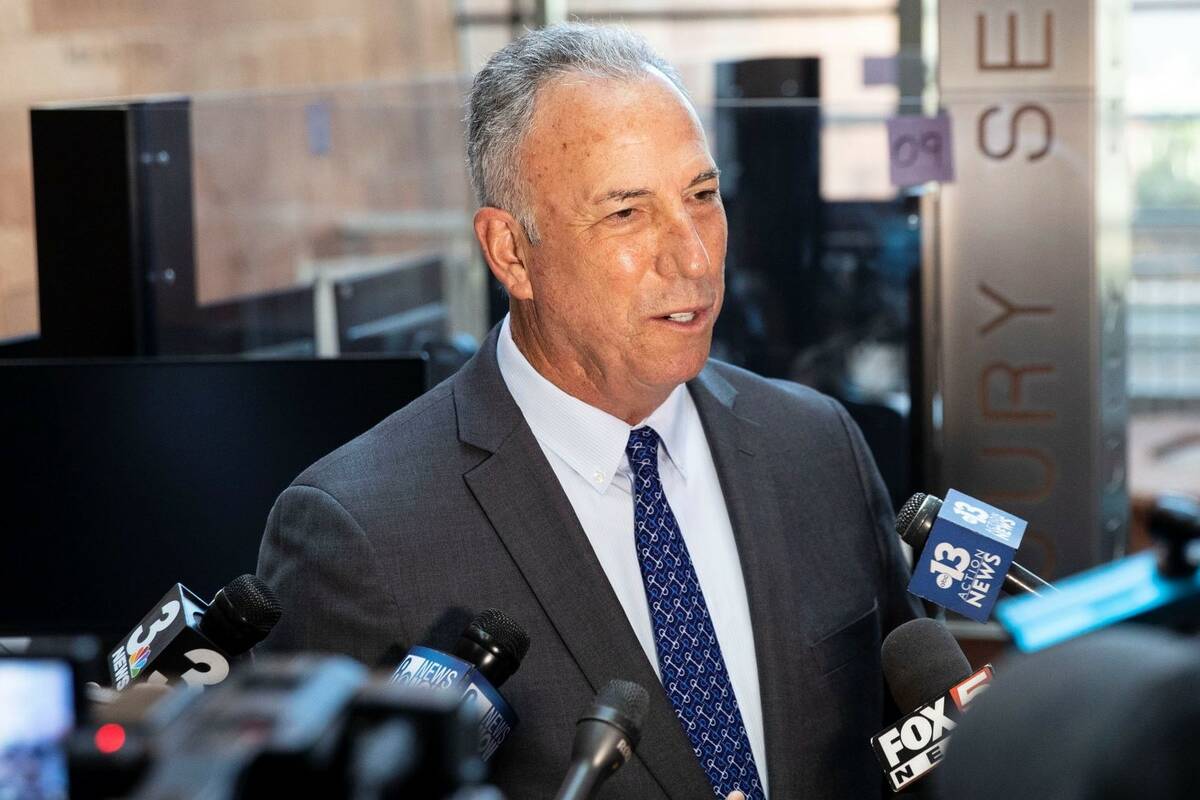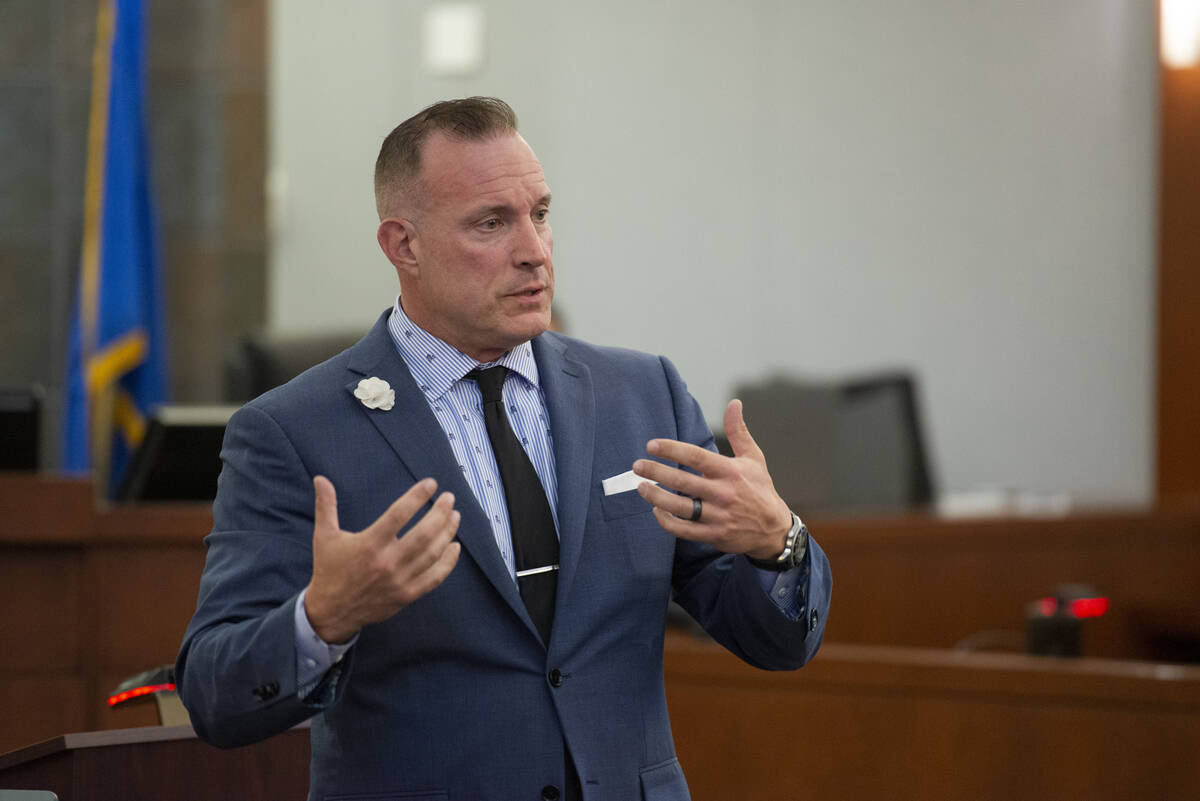Ex-cop facing ‘unusual,’ possibly unconstitutional criminal charge
Criminal libel is usually associated with countries that lack First Amendment-style protections, but Clark County District Attorney Steve Wolfson has decided to use the little-known — and some say unconstitutional — Nevada statute against a retired police officer accused of harassing his former supervisor.
Former Metropolitan Police Department detective Christopher Lange, who pleaded not guilty to charges of criminal libel and stalking, allegedly wrote 16 letters designed to cause personal and professional harm to Metro Lt. Richard Meyers, police said.
Lange’s attorney Jess Marchese said he had never heard of the charge before his client’s case.
“That was the first time I had seen it,” he said.
While Marchese said he wasn’t surprised by the misdemeanor charge for stalking brought against Lange, he had to consult the state statutes to verify that criminal libel was even a real charge. Attorneys say the charge is rare, and in 1998, a federal judge ruled the Nevada statute is unconstitutional because of the First Amendment to the Constitution.
The Nevada Press Association filed a lawsuit challenging the statute “as a matter of principle,” according to a Las Vegas Review-Journal article about the case.
Judge Johnnie Rawlinson ruled that the threat of prosecution for criminal libel “impermissibly chills” the constitutional right to speak and publish freely. The ruling was never published, so it is not considered precedent.
The 1911 law remains on the books, which Wolfson said allows him to proceed with the case.
The statute “remains a valid statute in the State of Nevada,” Wolfson said in his statement to the Review-Journal. “It has never been ruled unconstitutional in a published state or federal case.”
Wolfson’s statement conceded that prosecutions under the statute are uncommon, but “the facts of Mr. Lange’s case certainly warrant it.”
The unpublished case
The vast majority of libel cases in the United States are civil, but nearly half of U.S. states have laws that can put someone making a defamatory statement behind bars.
Nevada’s criminal libel statute — Nevada Revised Code 200.510 — was challenged when the Nevada Press Association brought its case against then-Attorney General Frankie Sue Del Papa in 1998.
The executive director of the association at the time, Kent Lauer, said that the law could be used to intimidate people as well as prosecute them, according to a Review-Journal report.
Kevin Doty, one of the press group’s attorneys back in 1998, argued that even factual statements can result in conviction.
“It’s possible for someone to go to jail for doing no more than telling the truth, under this statute,” said Doty, who is now Nevada’s senior deputy attorney general. He did not respond to requests for comment.
At the end of her ruling, Rawlinson, who declined to comment, writes that the Nevada statute is constitutionally flawed and that therefore, the state of Nevada is prohibited from enforcing it.
But Rawlinson’s judgment was unpublished, meaning it can’t act as a binding precedent. So the statute is still on the books.
Eric P. Robinson, associate professor at the University of South Carolina’s law and journalism schools who has studied criminal libel in the United States for about 15 years, said the language of the statute does not comply with the landmark 1964 Supreme Court case of Garrison v. Louisiana.
In the case, the U.S. Supreme Court reversed a decision by Louisiana’s Supreme Court, ruling that the state’s criminal libel law violated the First Amendment. The Louisiana law restricted the use of truth as a defense and only required that prosecutors show that a defendant acted with malice, rather than actual malice.
The difference between malice and actual malice is important, Robinson said. If someone acts with malice, this means they’re doing it out of spite or because they don’t like the other person.
Actual malice required prosecutors to prove that the defendant knew what they were saying was false or said something with reckless disregard for the truth, meaning there was reason to believe that the information may not have been true.
According to the court in Garrison, this means that a true statement can never serve as the basis for criminal libel, and actual malice must be proved to the normal criminal standard: beyond a reasonable doubt.
This case meant that many states’ existing libel laws were unconstitutional, Robinson said. Despite the ruling, Nevada has never “substantively” revised its criminal statute except by making the crime a gross misdemeanor, he added.
Nevada’s criminal libel statute only requires that prosecutors show that the defendant acted with malice, and not actual malice. It also puts a condition on the truth of the statement as a defense, requiring that the information was also published “for good motive and for justifiable ends.”
“Most of these statutes — including the Nevada one — were written a long time ago and don’t meet Constitutional standards,” Robinson said.
Wolfson declined an interview, and his statement did not address the Supreme Court decision on criminal libel.
The ‘thin-skinned’ public official
While the Clark County district attorney has the final say in what charges get leveled against a defendant, A. Jay Wagner, an associate professor of journalism at Marquette University and one of the few researchers to take a deep dive into criminal libel law, said that for a district attorney to bring this charge is “very questionable.”
“It’s government overreach,” he said.
Wagner said criminal libel cases often feature “officials that look thin-skinned.” He argued that part of being a public official is that people are going to have conversations about you.
And while there is no binding precedent preventing the district attorney from bringing this charge, there is evidence showing that public officials have harnessed what Wagner calls “zombie laws” to punish speech against them nationwide.
For instance, in 2018, a New Hampshire man named Robert Frese commented under an online article, accusing a retiring police officer of misconduct, according to a release from the American Civil Liberties Union. He also commented that a police chief had “covered up for this dirty cop.”
Frese was charged with criminal libel, a move that he called “utterly anti-American,” according to the ACLU. While police ultimately dropped the charges, the ACLU filed a lawsuit arguing that New Hampshire’s criminal libel law violates the First Amendment and gives law enforcement far too much discretion in deciding whom to prosecute.
In October 2023, the U.S. Supreme Court declined the ACLU’s petition for review of New Hampshire’s criminal libel law.
“We’re disappointed the court declined to hear this important case,” an ACLU representative said on their website. “Criminal defamation laws are easily susceptible to abuse.”
Robinson said he has seen one recurring situation: A citizen says something to anger a local official, and “they go to their buddy the district attorney and say, ‘You should do something about this.’ ”
Then, Robinson said, they “discover this dusty old criminal libel statute.”
Most states, Wagner said, are “not interested in calling balls and strikes on speech.” But in states that have a criminal libel statute on their books, Wagner acknowledges that “if somebody wants to bring it forward, they can.”
The chances of conviction are low, he added.
“They very rarely stick,” Wagner said. “Typically, they’re ruled out or called unconstitutional.”
He was unable to recall a single successful criminal libel case since publishing a report on the matter in 2012.
Legal experts were unsure just how often this charge has been brought in the state of Nevada. Groups like the ACLU of Nevada and the modern-day Nevada Press Association do not have in-house expertise on the issue of criminal libel.
“The problem is there’s no comprehensive database to find these cases,” Robinson said.
This lack of expertise led researchers such as Robinson to pursue the issue, but it remains relatively unknown, he said.
Wagner said prosecutors opted for a “curious route” to pursue a punishment for Lange. Most people don’t think criminal libel is good law, in the sense that it’s got good value in the courtroom or in that it’s good for society, he explained.
“There’s no place for it,” Wagner said.
Lange’s attorney Marchese said he showed the law to other attorneys who also had never heard of the charge.
“There’s no one to bump ideas off of,” he said.
The fact that the alleged victim is a police officer made him wonder if Wolfson would have made a similar charge if the victim wasn’t a government official.
“Would the average citizen get the same protections?” he asked. “I’m sure they dug deep into the statute book to find this one.”
This story has been updated to correct Christopher Lange’s former title. He is a former Metropolitan Police Department detective.
Contact Estelle Atkinson at eatkinson@reviewjournal.com.


















